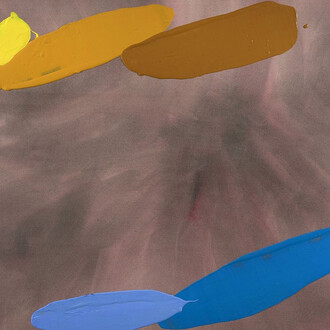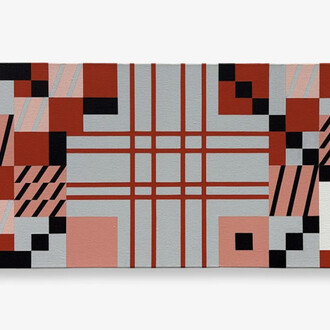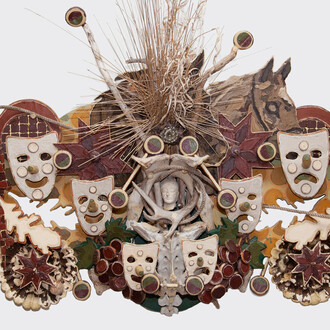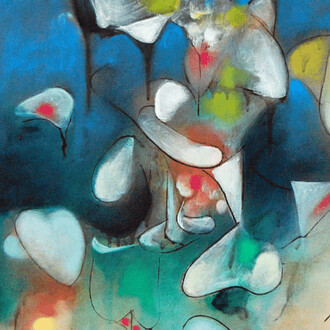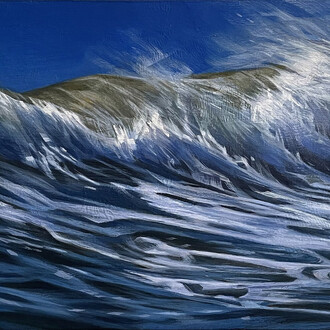Say, have you two met Jack Weinberg there in Chicago? He is a swell fellow and I really would like for you to meet him. He has several of my expressionistic canvases. He is a psychiatrist with whom I was with during the last war in San Antonio. I have the crazy notion that art could have a great therapeutic value with mental patients and I would like to, if I do go back in the army, to have a chance working again in therapy. It is exhausting but interesting work.
(From a letter Forrest Bess wrote to patrons Earle and Mary Ludgin, c.1950)
Franklin Parrasch Gallery is pleased to present "Jack was my first art collector”. Forrest Bess. From the Estate of Dr. Jack Weinberg, the sixth exhibition the gallery has organized devoted to the works of Forrest Bess and his vast influence on contemporary art. The title of the show, taken from a letter Bess wrote to collector Earle Ludgin on February 19, 1969, presents for the first time, this seminal collection from the Estate of Bess’s psychiatrist and first patron, Dr. Jack Weinberg. The collection is focused upon works spanning the late 1940s, including several key expressionist works, formational to the artist’s later ‘vision’ paintings, many of which he referenced in extensive letters to friends and colleagues.
Forrest Bess, (1911-1977, Bay City, TX) was among the most enigmatic American artists of the post-war era. His work life as both an oil field “roughneck” and a bait fisherman rarely intersected with his private and thoroughly focused daily painting practice. The profoundly faithful engagement Bess maintained with his creative energy and commitment as an artist, living on a remote fishing island off the coast of Texas, was a sacred and solipsistic endeavor.
The importance of Weinberg’s influence on Bess and his art practice cannot be overstated. In letters to art historian Meyer Schapiro, Earle and Mary Ludgin, and his gallerist Betty Parsons, among others, Bess definitively attributes Weinberg as his touchstone in realizing the painted renditions of his hallucinatory liminal sleep/wake states.
As Bess wrote to Meyer Schapiro in November 1951, “God knows I know no other trade than fishing and painting and the army in which I could survive. But more important the visions continue which means that there will be paintings".
Forrest Bess’s works have been shown extensively, including solo exhibitions at the Camden Art Centre (London, UK - 2022) and the Fridericianum, (Kassel, DE- 2020). In 2018, Bess was included in Los Angeles County Museum of Art’s exhibition Outliers and American Vanguard Art, which traveled to the National Gallery of Art (Washington, DC) and the High Museum of Art (Atlanta, GA).
Bess’s work was included in the Whitney Museum of American Art’s (New York, NY) group exhibition Human interest: portraits from the Whitney's Collection in 2016. In 2013, the Menil Collection (Houston, TX) hosted a major survey of Bess’s work titled Seeing things invisible, curated by Claire Elliott, which traveled to the Hammer Museum (Los Angeles, CA), Neuberger Museum of Art, (Purchase, NY), and Berkeley Art Museum and Pacific Film Archive, (Berkeley, CA). In 2012, Robert Gober curated a room of Bess’s work for the Whitney Biennial (New York, NY). Bess received the Mark Rothko Foundation Grant in 1973. Bess’s works reside in the permanent collections of the Los Angeles County Museum of Art (Los Angeles, CA), the Menil Collection (Houston, TX), the Museum of Modern Art (New York, NY), the Museum of Fine Arts, Houston (Houston TX), The Phillips Collection (Washington, DC), and the Whitney Museum of American Art (New York, NY), among many others.
Dr. Jack Weinberg emigrated with his family from Kiev, Russia (now Kyiv, Ukraine) to Chicago after World War I. He received his M.D. from the University of Illinois in 1936 and completed his psychoanalytic training in Chicago in 1942. Dr. Weinberg was on active duty in the U.S. Air Force during World War II, at which time he met and started treating Forrest Bess.
Dr. Weinberg was Clinical Director of the Illinois State Psychiatric Institute, a consultant to the Veterans Administration, a Professor of Psychiatry at the University of Illinois, and an important contributor to the psychiatric literature.
In the 1970s Dr. Weinberg received several prominent awards for his work in gerontology. He served as President of the APA Illinois District Branch (1966–67), as a member of the Group for the Advancement of Psychiatry and the American Association for the Advancement of Science, and as Treasurer (1973) and President (1977-78) of the American Psychiatric Association.









